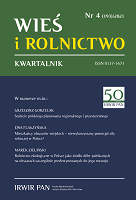Rolnictwo ekologiczne w Polsce jako źródło dóbr publicznych na obszarach szczególnie predestynowanych do jego rozwoju
Ecological Farming as a Source of Public Goods in Areas Particularly Predestined for its Development
Author(s): Marek ZielińskiSubject(s): Agriculture, Energy and Environmental Studies, Economic policy
Published by: Instytut Rozwoju Wsi i Rolnictwa Polskiej Akademii Nauk
Keywords: organic farming; new institutional economy; WRPP index; Common Agricultural Policy; municipalities with difficult and particularly difficult farming conditions;
Summary/Abstract: The aim of the study is to determine the state of organic farming development in Poland, including areas (municipalities) with difficult and particularly difficult farming conditions. It is also important to establish the environmental and organisational characteristics of agriculture from municipalities with high saturation with organic production. For this purpose, the data published by the Inspection of Commercial Quality of Agricultural and Food Products (IJHARS) for the years 2004–2020 and unit data from farms, as well as with regard to municipalities received from the Agency for Restructuring and Modernization of Agriculture (ARMA) and generated on the basis of applications from agricultural holdings applying for ecological payments under the Common Agricultural Policy (CAP) for 2010–2021. The first part emphasizes the role of organic farming as a supplier of public goods in the light of the new institutional economy and emphasizes the importance of institutions for the sustainability, continuity and stability of its functioning. In the second part, the state of development of organic farming in Poland in the years 2004–2021 was determined. On the other hand, in the third part, its condition in communes especially predestined for its development in 2010–2021. The fourth part dedicated to the research outcomes, shows the environmental and organisational features of agriculture in municipalities with different saturation with organic production supported under the CAP 2014–2020 in 2021. It was found that in 2010–2021, municipalities with difficult and particularly difficult farming conditions were located from 74.5% to 76.8% of the total UAA with organic production supported under the CAP. An important feature of organic farms from these municipalities was their average area of arable land, which was significant for average conditions for the country, and often the lack of livestock production or a conduct in a way that it is carried out regardless the principles of organic farming.
Journal: Wieś i Rolnictwo
- Issue Year: 193/2021
- Issue No: 4
- Page Range: 77-106
- Page Count: 30
- Language: Polish

